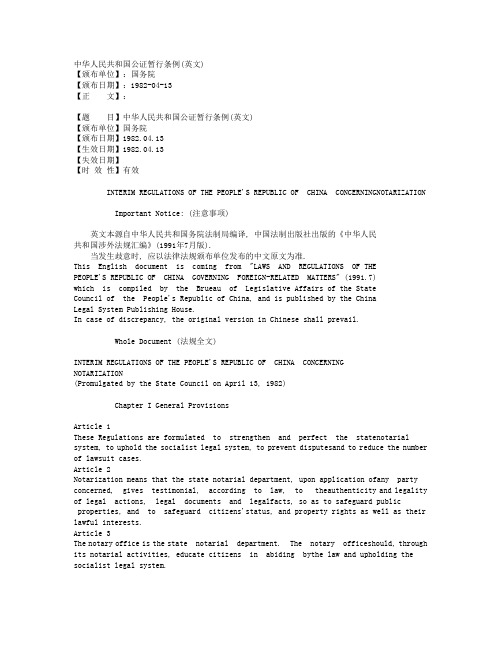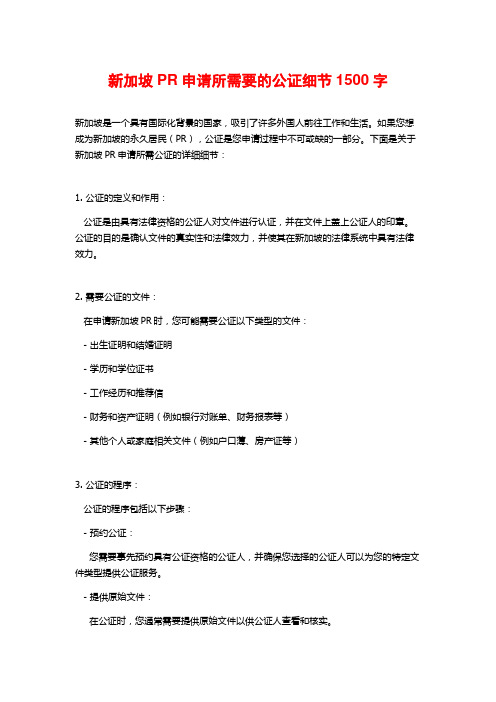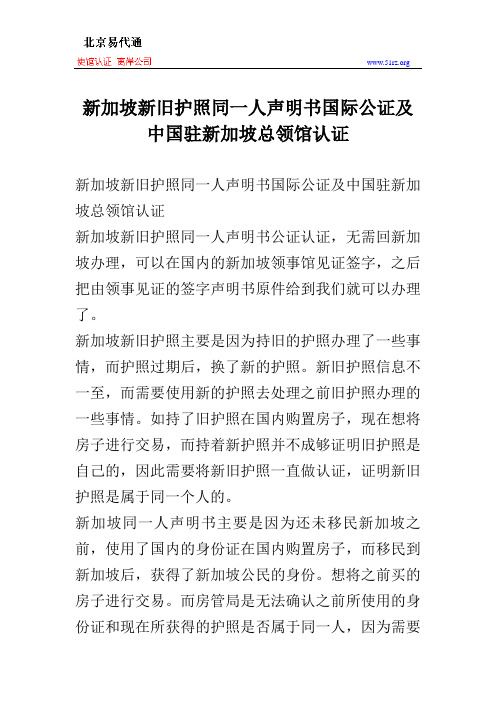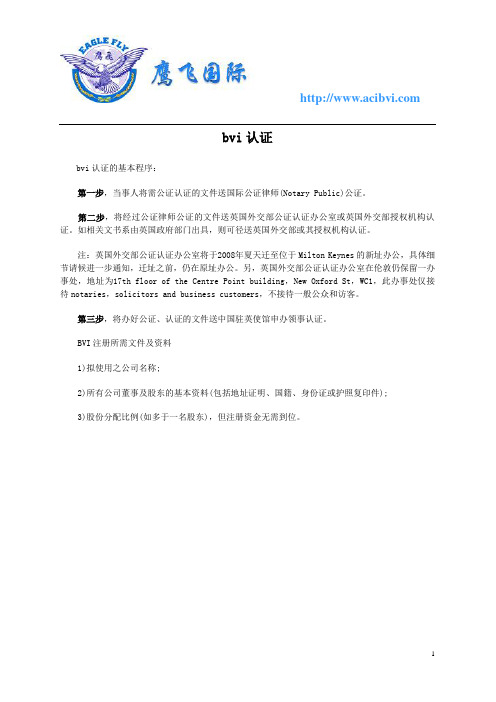notaries public rules 新加坡公证人规则
中华人民共和国公证暂行条例(英文)

中华人民共和国公证暂行条例(英文)【颁布单位】:国务院【颁布日期】:1982-04-13【正文】:【题目】中华人民共和国公证暂行条例(英文)【颁布单位】国务院【颁布日期】1982.04.13【生效日期】1982.04.13【失效日期】【时效性】有效INTERIM REGULATIONS OF THE PEOPLE'S REPUBLIC OF CHINA CONCERNINGNOTARIZATION Important Notice: (注意事项)英文本源自中华人民共和国务院法制局编译, 中国法制出版社出版的《中华人民共和国涉外法规汇编》(1991年7月版).当发生歧意时, 应以法律法规颁布单位发布的中文原文为准.This English document is coming from "LAWS AND REGULATIONS OF THEPEOPLE'S REPUBLIC OF CHINA GOVERNING FOREIGN-RELATED MATTERS" (1991.7)which is compiled by the Brueau of Legislative Affairs of the StateCouncil of the People's Republic of China, and is published by the ChinaLegal System Publishing House.In case of discrepancy, the original version in Chinese shall prevail.Whole Document (法规全文)INTERIM REGULATIONS OF THE PEOPLE'S REPUBLIC OF CHINA CONCERNINGNOTARIZATION(Promulgated by the State Council on April 13, 1982)Chapter I General ProvisionsArticle 1These Regulations are formulated to strengthen and perfect the statenotarial system, to uphold the socialist legal system, to prevent disputesand to reduce the number of lawsuit cases.Article 2Notarization means that the state notarial department, upon application ofany party concerned, gives testimonial, according to law, to theauthenticity and legality of legal actions, legal documents and legalfacts, so as to safeguard publicproperties, and to safeguard citizens'status, and property rights as well as their lawful interests.Article 3The notary office is the state notarial department. The notary officeshould, through its notarial activities, educate citizens in abiding bythe law and upholding the socialist legal system.Chapter II Scope of Business of Notary OfficeArticle 4The notary office shall handle the following items of business:(1) to give a testimonial to contracts (legal deeds), powers of attorney, wills;(2) to give a testimonial to right of inheritance;(3) to give a testimonial to donation of property and to partition of property;(4) to give a testimonial to the relationship of adoption;(5) to give a testimonial to family relationship;(6) to give a testimonial to identity (status), record of education, and personal experience;(7) to give a testimonial to a person's birth, marital status, existence and death;(8) to give a testimonial to the authenticity of signatures and seals on documents;(9) to give a testimonial to the conformity of duplicates, abridged versions, translations, and photo-offset copies to the original;(10) to give a testimonial to the effect of compulsory execution of documents concerning the claim for repayments of debt and articles in the event that such documents are considered to be unequivocal;(11) to be responsible for the preservation of evidence;(12) to be responsible for the safekeeping of wills or other documents;(13) to draft, on behalf of the party concerned, a document of application for a notarial deed;(14) to handle other notarial affairs in accordance with the application of the party concerned and international practice.Chapter III Organization and Leadership of Notary OfficeArticle 5The notary office shall be set up in municipalities directly under the Central Government, counties (or autonomous counties, and the same below), and municipalities. With the approval of the judicial administrative authorities of the province, autonomous region and municipality directly under the Central Government, a municipal district may also set up the notary office.Article 6The notary office shall be under the leadership of the judicial administrative authorities. The subordinative relationship does not exist between notary offices.Article 7The notary office shall have positions of notary and assistant notary. When necessary, it may have positions of director and deputy director. The positions of director and deputy director shall be assumed by notaries. The director and deputy director shall direct the work of the notary office, and must also execute the duties of notaries.Directors, deputy directors, notaries, and assistant notaries shall beappointed and removed respectively by the relevant people's government ofthe municipality directly under the Central Government, of the county, orof the municipality in accordance with the relevant provisions of the administration of cadres.Article 8Any citizen who has the right to elect and stands for elections and whomeet one of the following qualifications may be appointed as a notary:(1) graduates of law specialty of institutions of higher learning who havepassed the probation, and have engaged in judicial work, teaching of law,or research in law for 1 year or more;(2) those who have served in a people's court or a people's procuratorateas judges or procurators;(3) those who have engaged in judicial work in the judicial administrativedepartment for 2 years or more, or who have worked in other statedepartments, public organizations, or enterprises and institutions for 5years or more, and have the knowledge in law comparable to that ofgraduates from secondary law schools;(4) those who have served as assistant notaries for 2 years or more.Article 9Graduates from law schools at the secondary and higher levels who havepassed the probation, and government functionaries with the equivalentrecord of education, may be appointed as assistant notaries.Chapter IV JurisdictionArticle 10Notarial affairs shall be under the jurisdiction of the notary office atthe locality where the applicant has his/her residence registration, orwhere legal actions or legal facts have occurred.Article 11Notarial affairs concerning transfer of properties shall be under thejurisdiction of the notary office at the locality where the applicant hashis/her residence registration, or where principal properties are located.Article 12In the event that a number of persons concerned, who apply for thehandling of the same notarial affair, have their residence registration atdifferent localities that do not come under the jurisdiction of one andthe same notary office, or the properties are scattered in several areasthat come under the jurisdiction of different notary offices, thesepersons concerned may, through consultation, make their applications toany of those notary offices. In the event that the persons concerned failto reach an agreement, the different notary offices concerned shallcoordinate in jurisdiction out of consideration for the convenience of thepersons concerned.Article 13In the event that jurisdictional disputes arise among various notaryoffices, their common superior - the judicial administrative authoritiesat a higher level shall designate the jurisdiction.Article 14The Ministry of Justice and the judicial departments of various provinces, autonomous regions, and municipalities directly under the Central Government shall have the authority to assign a certain notary office to handle a particular notarial affair.Article 15The embassy or consulate of China in a foreign country may handle notarial affairs at the request of a Chinese citizen residing in the foreign country where there is Chinese embassy or consulate.Chapter V Procedures for the Handling of Notarial AffairsArticle 16In applying for notarization, a party concerned shall go to the notary office personally to make an application in writing or verbally. If the application affair is entrusted to an agent, certifying documents of the power of attorney shall be presented. However, the application affair shall not be entrusted to an agent if the party concerned applies to the notary office for a testimonial concerning a power of attorney, a statement, adoption of children, a will, or signatures and seals; if the party concerned has true difficulty in making the application, the notary may go to the locality where the party concerned resides, to handle the notarial affairs.In the event that state organs, public organizations, enterprises and institutions apply for notarization, they shall send their representatives to the notary office. The representatives shall present their certifying documents of the power of representation.Article 17Notaries shall not handle notarial affairs which they themselves or their spouses, or which the near relatives of themselves or their spouses apply for; in addition, they shall not handle notarial affairs that they themselves or their spouses have interests in. The parties concerned shall have the right to apply for the withdrawal of any of the notaries.Article 18The notaries must examine the status of the parties concerned and their ability to exercise rights and to perform obligations; and must examine the authenticity and legality of the facts, documents and other relevant documents, with regard to all of which the persons concerned are applying for a testimonial.Article 19In the event that the notary office holds that the evidence provided by the persons concerned is not complete or is doubtful, it has the right to notify the persons concerned that they make necessary additions to complete the evidence, or it may consult the departments or individuals concerned and ask them to provide certifying documents and materials. The departments and individuals concerned shall have the obligation to render assistance.Article 20Notaries shall prepare notarial documents in accordance with the format prescribed or approved by the Ministry of Justice.。
新加坡PR申请所需要的公证细节

新加坡PR申请所需要的公证细节1500字新加坡是一个具有国际化背景的国家,吸引了许多外国人前往工作和生活。
如果您想成为新加坡的永久居民(PR),公证是您申请过程中不可或缺的一部分。
下面是关于新加坡PR申请所需公证的详细细节:1. 公证的定义和作用:公证是由具有法律资格的公证人对文件进行认证,并在文件上盖上公证人的印章。
公证的目的是确认文件的真实性和法律效力,并使其在新加坡的法律系统中具有法律效力。
2. 需要公证的文件:在申请新加坡PR时,您可能需要公证以下类型的文件:- 出生证明和结婚证明- 学历和学位证书- 工作经历和推荐信- 财务和资产证明(例如银行对账单、财务报表等)- 其他个人或家庭相关文件(例如户口薄、房产证等)3. 公证的程序:公证的程序包括以下步骤:- 预约公证:您需要事先预约具有公证资格的公证人,并确保您选择的公证人可以为您的特定文件类型提供公证服务。
- 提供原始文件:在公证时,您通常需要提供原始文件以供公证人查看和核实。
- 公证人的确认:公证人将核对您的身份和文件的真实性,并在文件上盖上公证人的印章。
- 公证文件:完成公证后,公证人将给您一份公证文件副本,该副本将提供给您以备将来使用。
4. 公证的要求:在公证过程中,您需要确保以下要求得到满足:- 文件的完整性:您需要确保您的文件是完整的,没有缺页或篡改。
公证人将对文件进行仔细检查,并拒绝公证不完整或有疑义的文件。
- 文件的翻译:如果您的文件不是英文的,您需要提供文件的英文译本。
译本需由资质认可的翻译人员翻译并加盖翻译人员的印章。
- 文件日期:您的文件不能过时,通常要求文件在最近几个月内。
- 公证费用:公证费用是公证服务的一部分,您需要支付适用的费用,费用根据文件类型和数量而异。
5. 公证人的选择:在新加坡,有许多专业的公证人可以提供公证服务。
您可以通过查询新加坡公证员公会(Singapore Notarial Services)的网站或联系新加坡领事馆或大使馆以获得相关信息。
新加坡的生活法律规定(3篇)

第1篇一、引言新加坡,一个位于东南亚的热带岛国,以其高度发达的经济、优美的环境和严格的法律法规著称。
新加坡的法律体系以英国普通法为基础,并结合了当地的一些法律传统和亚洲的法律特点。
本文将详细介绍新加坡的生活法律规定,涵盖婚姻家庭、财产继承、居住环境、公共秩序、交通安全、食品安全等多个方面。
二、婚姻家庭法律1. 婚姻登记在新加坡,男女双方必须向婚姻注册处申请结婚登记。
婚姻注册处会审查双方的身份证明、年龄证明和婚姻状况证明,确认双方符合结婚条件后,予以登记。
2. 婚姻无效新加坡法律规定,以下情况下婚姻无效:(1)一方为未成年人;(2)双方为直系血亲或旁系血亲;(3)一方已婚或存在其他法律禁止的婚姻关系;(4)双方患有传染病、精神病或其他疾病。
3. 离婚新加坡实行无过错离婚制度,即离婚不需要证明一方有错。
双方同意离婚的,可向法院申请离婚。
法院在审查离婚申请时,会考虑以下因素:(1)婚姻关系是否存在严重的不和;(2)双方是否愿意通过调解解决离婚事宜;(3)离婚对子女的影响。
4. 家庭暴力新加坡法律严厉打击家庭暴力,受害者可向法院申请保护令。
法院在审理家庭暴力案件时,会考虑以下因素:(1)家庭暴力的性质和严重程度;(2)受害者是否愿意接受保护令;(3)受害者与施暴者的关系。
三、财产继承法律1. 继承顺序新加坡法律规定,遗产继承顺序为:(1)配偶;(2)子女;(3)父母;(4)兄弟姐妹。
2. 遗嘱立遗嘱是新加坡法律规定的一种合法继承方式。
遗嘱人可在遗嘱中指定继承人、遗产分配比例等事项。
3. 继承税新加坡实行遗产税制度,遗产价值在一定额度以上的需缴纳遗产税。
四、居住环境法律1. 住宅租赁新加坡法律规定,住宅租赁合同应书面签订,明确租赁期限、租金、押金等事项。
2. 房屋所有权新加坡实行房屋所有权制度,居民可通过购买、继承等方式获得房屋所有权。
3. 环境保护新加坡对环境保护高度重视,严格规定工业排放、垃圾处理、噪音控制等事项。
名词变复数变化规则

名词变复数变化规则在此类复合名词中,第一个名词可以看作是第二个名词的定语,所以第二个名词是中心词,所以变复数时绝大多数只需把第二个名词变复数,例如:pen-friend→pen-friends (笔友)bookshelf→bookshelves (书架)fireman→firemen(消防员)chairwoman→chairwomen(女主席)例外:man/woman+名词,前后均变复数。
man teacher→men teachers(男老师)woman doctor→women doctors(女医生)注意:动名词+名词(或名词+动名词)构成的复合名词,也属双名词类,遵循普通规则。
sleeping-pills(安眠药)writing materials (书写材料)horse-ridings(骑马)sight-seeings(观光)单名词类:名词(或动名词)+非名词此类中,作为整个复合名词的主体或中心,不管名词(或动名词)在什么位置,都把复数标志“-s”放在其右侧。
1.名词+介词或介词短语passers-by(过路人)runners-up(亚军)mothers-in-law(岳母/婆婆)brides-to-be(准新娘)2.动名词+副词(或副词+动名词)goings-on(行为,事件)incomings(收入)outgoings(支出)注意:有些词单复数语义不同。
incoming(进来),outgoing(外出)。
3.名词+形容词secretaries general(秘书长)notaries public(公证员)poets laureate(桂冠诗人)knights errant(侠客,游侠骑士)注意:“形容词+名词”有些是复合名词,有些是名词短语,虽然都是把中心名词变复数,但两者意思不同。
非名词类:非名词+非名词此类中,既然无中心名词(或动名词),只能在整个复合名词的最后加s。
1.动词+副词take-offs(起飞)stand-bys(支持者)breakdowns(损坏,故障)takeovers(接管)注意:复合名词有的有连字符,有的没有。
新加坡法律法规

商法的改革与发展
商法的改革
随着商业实践的发展和变化,新 加坡商法不断进行改革,以适应
新的商业需求和挑战。
商法的国际化
新加坡商法不断与国际接轨,吸 收国际商法的先进理念和制度,
提高其国际竞争力。
商法的未来发展
未来新加坡商法将继续关注商业 实践的发展趋势,不断完善相关 法律法规,以适应新的商业需求
和挑战。
对于某些特定类型的犯罪行为 ,刑法还规定了加重处罚的情 节,如累犯、共同犯罪等。
刑法还规定了正当防卫、紧急 避险等免责事由,以保护公民 的合法权益。
刑法的实施与执行
刑法的实施由新加坡法院负责,包括 刑事审判和刑罚执行。
对于被判有罪的罪犯,法院将根据其 犯罪情节和悔罪表现,依法判处相应 的刑罚,如监禁、罚款等。
1999年
修订《宪法》,增加总检察长 作为总检察署的首长
宪法的结构与特点
01
02
03
序言
阐述宪法的制定目的和原 则
第一章
规定宪法的基本结构和主 权
第二章
规定公民的基本权利和自 由
宪法的结构与特点
第三章
规定政府的组成和职权
第四章
规定议会的组成和职权
第五章
规定法院的组成和职权
宪法的结构与特点
第六章
规定财政和行政
第七章
规定紧急状态和战争状态
第八章
规定宪法的修改程序
宪法的主要内容
在此添加您的文本17字
保障公民的基本权利和自由,包括言论、集会、结社、宗 教信仰等自由权利,以及不受任意逮捕、拘禁、搜查、审 讯等权利。
在此添加您的文ห้องสมุดไป่ตู้16字
规定政府的组成和职权,包括行政、立法、司法等部门的 组成和职权范围。
新加坡新旧护照同一人声明书国际公证及中国驻新加坡总领馆认证

新加坡新旧护照同一人声明书国际公证及中国驻新加坡总领馆认证新加坡新旧护照同一人声明书国际公证及中国驻新加坡总领馆认证新加坡新旧护照同一人声明书公证认证,无需回新加坡办理,可以在国内的新加坡领事馆见证签字,之后把由领事见证的签字声明书原件给到我们就可以办理了。
新加坡新旧护照主要是因为持旧的护照办理了一些事情,而护照过期后,换了新的护照。
新旧护照信息不一至,而需要使用新的护照去处理之前旧护照办理的一些事情。
如持了旧护照在国内购置房子,现在想将房子进行交易,而持着新护照并不成够证明旧护照是自己的,因此需要将新旧护照一直做认证,证明新旧护照是属于同一个人的。
新加坡同一人声明书主要是因为还未移民新加坡之前,使用了国内的身份证在国内购置房子,而移民到新加坡后,获得了新加坡公民的身份。
想将之前买的房子进行交易。
而房管局是无法确认之前所使用的身份证和现在所获得的护照是否属于同一人,因为需要将身份证和护照做同一人声明书。
新加坡新旧护照和同一人声明书都是用于证明同一个人的。
而二者的文件要在国内使用也都需要经过使馆公证认证。
文件在国内才具有法律效力。
新加坡新旧护照使馆认证的资料:1.新加坡旧护照的扫描件或者复印件;2.新加坡新护照的扫描件或者复印件;3.新加坡使馆认证申请委托书。
新加坡同一人声明书使馆认证的资料:1.新加坡同一人声明书扫描件或者复印件;2.新加坡护照的扫描件或者复印件;3.新加坡使馆认证申请委托书。
新加坡新旧护照和同一人声明书的使馆认证流程:1、首先提供资料有当地的公证员进行公证2、送往新加坡法律学会进行认证3、最后送往中国驻新加坡大使馆进行认证新加坡新旧护照和同一人声明书的使馆认证大约需要20工作日。
来源于/。
新加坡财产分配法律规定(3篇)

第1篇一、引言新加坡作为一个高度发达的国家,其法律体系严谨而完善。
在财产分配领域,新加坡的法律规定旨在确保公平、合理地处理遗产、婚姻关系中的财产分割等问题。
本文将详细介绍新加坡财产分配的法律规定,包括遗产继承、婚姻财产分割等方面的内容。
二、遗产继承法律制度1. 继承人范围根据新加坡《遗产法》(Wills Act),遗产继承人包括:(1)法定继承人:配偶、子女、父母、兄弟姐妹、祖父母等。
(2)遗嘱继承人:遗嘱中指定的继承人。
(3)遗赠人:在遗嘱中指定的受益人。
2. 继承顺序在新加坡,遗产继承的顺序如下:(1)遗嘱继承人:按照遗嘱指定的顺序继承。
(2)法定继承人:在没有遗嘱或遗嘱无效的情况下,按照法定继承顺序继承。
(3)遗赠人:在遗嘱中指定的受益人。
3. 继承份额在遗产继承中,继承人的份额按照以下原则确定:(1)配偶享有优先权,可继承遗产的一半。
(2)子女、父母、兄弟姐妹等法定继承人按照法定份额继承。
(3)遗嘱继承人按照遗嘱指定的份额继承。
4. 继承税新加坡实行遗产税制度,遗产价值在一定金额以上的需缴纳遗产税。
遗产税的税率根据遗产价值的不同而有所区别。
三、婚姻财产分割法律制度1. 婚姻财产制度新加坡实行夫妻共同财产制度,夫妻在婚姻关系存续期间所得的财产属于夫妻共同财产。
2. 财产分割原则在婚姻关系终止时,夫妻共同财产应按照以下原则进行分割:(1)公平合理:分割财产时,应考虑夫妻双方在婚姻关系中的贡献、经济状况等因素,确保分割结果公平合理。
(2)平等原则:分割财产时,应保证夫妻双方在财产分割中获得相等的份额。
(3)协商一致:夫妻双方在分割财产时,应尽量协商一致,避免诉讼。
3. 财产分割程序在新加坡,婚姻财产分割的程序如下:(1)双方协商:夫妻双方在婚姻关系终止时,首先应尝试协商解决财产分割问题。
(2)调解:如果协商不成,可以向法院申请调解。
(3)诉讼:在调解失败的情况下,可以向法院提起诉讼,由法院判决财产分割。
bvi认证

bvi认证
bvi认证的基本程序:
第一步,当事人将需公证认证的文件送国际公证律师(Notary Public)公证。
第二步,将经过公证律师公证的文件送英国外交部公证认证办公室或英国外交部授权机构认证。
如相关文书系由英国政府部门出具,则可径送英国外交部或其授权机构认证。
注:英国外交部公证认证办公室将于2008年夏天迁至位于Milton Keynes的新址办公,具体细节请候进一步通知,迁址之前,仍在原址办公。
另,英国外交部公证认证办公室在伦敦仍保留一办事处,地址为17th floor of the Centre Point building,New Oxford St,WC1,此办事处仅接待notaries,solicitors and business customers,不接待一般公众和访客。
第三步,将办好公证、认证的文件送中国驻英使馆申办领事认证。
BVI注册所需文件及资料
1)拟使用之公司名称;
2)所有公司董事及股东的基本资料(包括地址证明、国籍、身份证或护照复印件);
3)股份分配比例(如多于一名股东),但注册资金无需到位。
1。
- 1、下载文档前请自行甄别文档内容的完整性,平台不提供额外的编辑、内容补充、找答案等附加服务。
- 2、"仅部分预览"的文档,不可在线预览部分如存在完整性等问题,可反馈申请退款(可完整预览的文档不适用该条件!)。
- 3、如文档侵犯您的权益,请联系客服反馈,我们会尽快为您处理(人工客服工作时间:9:00-18:30)。
notaries public rules 新加坡公证人规则新加坡公证人规则
公证人在新加坡扮演着重要的角色,他们与法律有关的文件和证明进行验证,
并通过签字和盖章认证其真实性。
新加坡公证人规则旨在确保公证人的职责和责任得到准确执行,以维护社会公正和法律的有效性。
以下是与新加坡公证人规则相关的几个关键要点:
1. 资格和注册要求:为了成为一名合格的公证人,个人必须满足特定的资格和
注册要求。
根据新加坡政府法律,公证人必须是新加坡公民或永久居民,并且持有法律执业资格。
他们还必须通过特定的考试,并在注册局进行注册。
2. 维护独立性和中立性:公证人必须保持独立和中立的立场,免受外界的影响
和干扰。
他们不得从事与其公证职责无关的业务或接受可能产生利益冲突的工作。
这确保了公证人的专业性和公正性。
3. 文件和证明的验证:公证人负责验证各种法律文件和证明的真实性。
这包括
但不限于识别当事人、确认文件真实性和完整性、保证文件的公平性和合规性等。
公证人必须严格按照相关法规执行这些验证程序。
4. 签字和盖章认证:公证人通过在文件上签字和盖章认证的方式证明其真实性。
这些签字和盖章具有法律效力,并被普遍承认。
公证人必须确保签字和盖章的准确性和合规性,以防止伪造和滥用。
5. 保存和保护文件:公证人有责任妥善保存和保护所有与公证事务相关的文件
和记录。
他们必须确保文件的保密性和安全性,并在需要时依法提供给有权机构和利益相关者。
通过遵守新加坡公证人规则,公证人在履行他们的职责时能够确保公正和可靠。
这有助于维护法律制度的有效性,并赋予法律文件和证明更高的可信度和可靠性。
